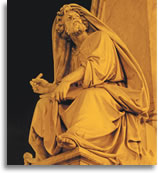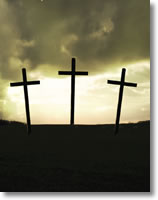by Dr. Reed Lessing
“The party’s over!”
 |
|
© Jozef Sedmak/
|
This can mean “It’s 2 a.m., and I have got to go to work in six hours!” Or “Everyone’s leaving!” Or maybe “You’re all out of stuff to eat and drink!”
On the other hand, “the party’s over” can convey the idea that “It’s all over, the fat lady has sung, and mighty Casey has struck out!”
This second sense of “the party’s over” coincides with Isaiah’s vision of universal judgment in chapter 24 of his Old Testament book. He writes, in part: “The gaiety of the tambourines is stilled, the noise of the revelers has stopped, the joyful harp is silent. No longer do they drink wine with a song. . .” (Is. 24:8–9a NIV).
This party is finished and done. It’s over!
In some places, the Old Testament flows like a brook toward its fulfillment in the New Testament. In other places, it may be likened to a quiet backwater or small stream. In Isaiah, though, we come upon a rushing river that moves us mightily toward the message of salvation in Jesus Christ. Because of his clear and compelling testimony about the coming Savior, St. Jerome called Isaiah “the Fifth Gospel” while another Church father, John Chrysostom, called him “the prophet with the loudest voice.”
It comes as no surprise, then, that after the Lord’s cosmic condemnation of human sin depicted throughout chapter 24, Isaiah states in chapter 25, “On this mountain the Lord Almighty will prepare a feast” (Is. 25:6a). Devastation will give way to deliverance, and judgment will give way to inexpressible joy. God’s people will drink wine again with a song!
Death before Deliverance
 |
|
© DesignPics, Inc. |
Isaiah’s grand celebration is founded on the fact that the Lord “will swallow up death forever” (Is. 25:8a). However, before something is swallowed, first it is tasted. Heb. 2:9 maintains that Jesus “suffered death, so that by the grace of God, He might taste death for everyone.” On Good Friday, He tasted the soldiers’ spit, their cheap wine, sweat running down His cheeks, and His own blood. But there was more. Jesus drank the cup of the Father’s wrath. And He drained it to the very last drop. At that very moment, the enemy stalked our Savior, took aim, shot straight, and killed. It all ended “crucified, dead, and buried.” Nothing is as bottomless as a pit, as lifeless as a grave, as hopeless as a tomb. Smell the mildew, the odor of blood, the stench of death. See the confines, the darkness, and the sealed stone.
The Life of the Party
But also witness the charred marks of a divine explosion to life! On that first Easter, John outruns Peter. Mary cries out, “Rabboni!” The Emmaus disciples feel their hearts burn. And later, Thomas exclaims, “My Lord and my God!” After tasting death, Jesus swallowed it, chewed it up, and spit it out. Now He is Life overriding death and making all things new. “In Him was life, and that life was the light of men” (John 1:4). “I am the Bread of Life” (John 6:35). “‘You have the words of eternal life’” (John 6:68). “I have come that they may have life” (John 10:10). “I am the Resurrection and the Life” (John 11:25). “I am the Way and the Truth and the Life” (John 14:6). Because Jesus is the Life of this eternal party, far from being over, this celebration has just begun! Isaiah announces, “On this mountain the Lord Almighty will prepare a feast of rich food for all peoples, a banquet of aged wine—the best of meats and the finest of wines” (Is. 25:6).
Who Is Invited?
Every gala event elicits questions, one of which is, “Who is invited?” Within Is. 25:6–8, the prophet repeatedly announces that everyone is welcome. Isaiah employs the terms all peoples, all nations, all faces, and all the earth.
Note the sequence. “All peoples” denotes all ethnic groups. “All nations” points to all political groups. “All faces” promises that all individuals are summoned. And, just in case we miss it, Isaiah concludes 25:8 with “all the earth. The Lord has spoken.” All are invited!
Tony Campolo, in his book, The Kingdom of God Is a Party, tells the story of John Carlson, who noticed that in his town on the night of the senior prom only the kids who were preppy, polished, and popular were invited. The prom left out those whom “the system” deemed rejects and losers. So Carlson came up with the idea of holding an event for teens that could not get a date because they were not all-state and were considered second rate. He called it the “reject prom.”
Have you ever been rejected? Told you don’t belong? Have you ever experienced partner rejection? Peer rejection? Parental rejection? Parishioner rejection? Or perhaps you are stuck in the hell of deep-running personal rejection. Isaiah’s Easter party is for everyone. All are invited! You are invited!
What about My Appearance?
Another question often asked in conjunction with parties is this: “What about my appearance?” Isaiah says, “Come as you are.” But you say, “My face bears the marks of worry. My shoulders are stooped from carrying life’s burdens. My lips are dirty from slander. My heart is hardened toward my children. My arteries are clogged with bitterness and resentment. And my hands are clutched in anger because I keep accusing others for all this unhappiness!” So you are thinking, “What do you mean, Isaiah? Come as you are? I am a spiritual mess!” And the prophet responds, “So am I!”
One day, while he was worshiping in the Jerusalem temple, Isaiah caught a vision of God’s holiness. He cried out, “Woe to me! . . . I am ruined! For I am a man of unclean lips, and I live among a people of unclean lips, and my eyes have seen the King, the Lord Almighty” (Is. 6:5). What an experience! Isaiah knows all about shame and guilt. So much so, that he wants to die. This is why, in connection with the Easter celebration, he mentions “the shroud that enfolds all peoples, the sheet that covers all nations” (Is. 25:7). The prophet knows about our sinful predicament that tempts us to hide our mess with shrouds and sheets, addictions and compulsions, games and gimmicks. Nothing works. We end up with tears on our faces and deep-seated disgrace (Is. 25:8).
But the absolutely amazing fact is that this celebration is a “come as you are” party. Our God fully forgives us and extravagantly dresses us for the feast. In the parable of the prodigal son, the father says, “Bring the best robe and put it on him. Put a ring on his finger and sandals on his feet. . . . Let’s have a feast and celebrate!” (Luke 15:22, 23). This same Father provides the proper attire for us prodigals: Easter baptismal robes washed white in the blood of the Lamb!
What Gifts Should I Bring?
 |
|
© Denise Lafferty/
|
Everyone is welcome, and we may come just as we are. But what party gifts should we bring? Isaiah says in effect, “You do not need them. Not even one!”
Let me explain. I loved being the pastor at Trinity Lutheran Church in Broken Arrow, Okla., because, among other things, we had church potlucks down to a theological art. My directions as the pastor went something like this. “You bring some chips, she’ll bring some dessert (please make that pecan pie!), I’ll bring some salad, and make sure Robert Buffington brings the main course!” (Robert Buffington is a terrific master chef.)
But for this Easter party we bring nothing. It is the antithesis of church potlucks! In Is. 25:6–8, the Lord is the subject of the verbs: He will prepare, He will destroy, He will swallow up, He will wipe away, and He will remove!
In another parable, Jesus compares this feast as follows, “At the time of the banquet he sent his servant to tell those who had been invited, ‘Come, for everything is now ready’” (Luke 14:17).
We bring nothing to this party, because our God puts everything on the table. His gifts of mercy and grace were purchased at the cost of spitting, mocking, whipping, nailing, bleeding, sweating, and dying.
Make no mistake about it. Easter is not a Good Friday-denying event. Nor does it ignore Good Friday’s terrible truth of our wickedness and sin. The scar tissue of Friday forever lingers in the body of Christ, and it protests against every form of Christian celebration that says we can enjoy heaven now while still living on planet earth. No, we cannot. You and I live in a world of personal, national, and global suffering, but (and make no mistake about this either!) we affirm that Jesus bodily lives to give the gifts. “A feast of rich food, a banquet of aged wine—the best of meats and the finest of wines” (Is. 25:6). Among other things, the prophet points to our Savior’s true body and blood given in the Eucharistic Feast, through which we receive forgiveness, life, and salvation—forevermore!
RSVP?
Finally, with most parties there is an RSVP. The Lord is so passionate about our presence at this banquet that He gives us the words of response: “In that day they will say, ‘Surely this is our God; we trusted in Him, and He saved us’” (Is. 25:9). That day is every Lord’s Day when we come to the ongoing Easter feast of victory for our God. Our celebration begins every time we sing “Holy, holy, holy Lord, God of power and might,” hear our pastor speak the words of institution, and approach the table singing, “Lamb of God, You take away the sin of the world.” With the final trumpet call, the banquet will be brought to completion in the marriage feast of the Lamb in His kingdom, where we will sing an endless and deathless “Hallelujah!” And it all means that during this joyful Eastertide it is time to drink wine again with this song: “The feast is ready. Come to the feast, the good and the bad. Come and be glad! Greatest and least, come to the feast!” (Lutheran Worship 346).
—
About the Author: Dr. Reed Lessing is director of the graduate school and associate professor of exegetical theology at Concordia Seminary, St. Louis, Mo. He is the author of the Concordia Commentary series volumes on Jonah and Amos as well as the forthcoming volume on Isaiah 40–55.





